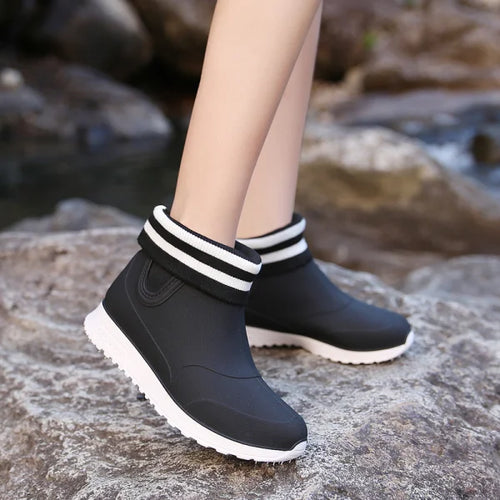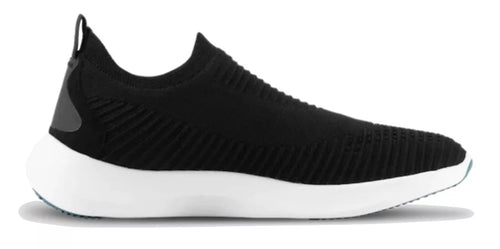There is no doubt that genuine leather gives us unique, stylish, durable, and waterproof shoes. However, as time passed, one thing led to another, and synthetic leather was born. Soon, it took over the shoe industry.
But is synthetic leather as waterproof as the real one? Well, in this article, we will provide answers to most of your queries regarding synthetic leather.
Check out Loom products here >>
What is the Difference Between Leather and Synthetic Leather Shoes?
While it might be difficult for an untrained eye to spot a difference between the two, if you look closely, you'll definitely find it. However, the real question here isn’t about appearance. It is about how different you feel while wearing either of them.
|
|
Leather Shoes |
Synthetic Leather Shoes |
|
Pros |
. Luxurious . Durable . Versatile |
. Affordable . Flexible . Comfortable . Easy to maintain . Animal cruelty-free . Continuously improving technology |
|
Cons |
. Heavier . Require higher maintenance . Expensive |
. Comparatively less durable |
are synthetic leather shoes waterproof?
Well, the short answer is: yes, any synthetic material can be made waterproof by adding certain chemicals to it.
Synthetic leather shoes offer great waterproof qualities. Since this is a man-made material, it can be mixed and matched with a few materials such as neoprene, rubber, polyurethane, H2-Go, or nylon etc., to add waterproof features.
Adding a waterproof layer is a brilliant concept. Companies like Loom Footwear have created masterpieces using this technology. They add an H2-Go layer to provide the users with a completely waterproof shoe.
Moving ahead, before we look into the detailed difference between the two, let’s officially define these terms.
● LeatherLeather is manufactured by the tanning of rawhide(mostly cattle) and animal skin. Its basic qualities include high durability and supreme flexibility. There are a variety of leather goods such as belts, jackets, shoes, etc. in the market.

When it comes to footwear, leather is used in all shapes and sizes. There are various old school techniques that bring these classic leather shoes to life. Be it a heavy-duty, safety work boot, or a casual, flexible shoe, leather has conquered it all.
Leather shoes are great for all seasons, indoors and outdoors. Also, they bring the highest levels of flexibility and comfort. Cleaning a leather shoe is always like a breeze. Furthermore, they offer adequate waterproof features that are always considered a plus point.
However, leather shoes are heavy. This is especially true when we compare them to synthetic leather shoes.
● Synthetic LeatherUnlike the genuine leather, synthetic leather is man-made. As its name suggests, it is synthesized from man-made materials such as polyester, nylon, acetate, spandex, acrylic, latex, orlon, and kevlar. The list can go on and on, as the synthetic leather industry has grown exponentially over the years.

There are many reasons why synthetic leather shoes became popular in the presence of leather shoes. They offer some unique qualities that leather shoes do not.
While buying a shoe, we normally pay close attention to one very important thing; the shoe’s weight. If it feels heavy, we are most likely to skip that purchase.
This is where synthetic leather shoes take the lead. They are super lightweight in comparison to genuine leather shoes.
Also, they offer great breathability. With these shoes, you can say goodbye to smelly and sweaty feet for good.
Another important question that often surfaces is, “are synthetic leather shoes waterproof?”. Well, the short answer is: yes, any synthetic material can be made waterproof by adding certain chemicals to it.
Now, as we are clear on the basic differences between the two, let’s look a little deeper at how the major shoe features are affected:
1- Durability
Of course, genuine leather boots live longer than faux leather shoes. However, the durability of the latter can be increased.
Leather comes in many different types. The most durable ones include top-grain and full-grain leather. These are mostly used in making heavy-duty work boots.
Another known type is Suede. It is genuine but comparatively softer and requires higher maintenance.
With synthetic leather, it becomes a little difficult to pick the most durable one as there are a lot of variants. However, the easiest way is picking up the highest quality synthetic leather. It is durable and looks better.
Keep in mind that the longevity of a pair of shoes highly depends on how you wear it. Rough and careless use tends to lower a shoe’s life, be it genuine or synthetic leather.
2- Appearance
Leather has a natural look, while synthetic leather is purposefully made to look like genuine leather. Hence, it isn’t much of an issue. If you look closely, you will see the imperfections in a leather shoe that makes them unique and one of a kind.
On the other hand, faux leather shoes are processed and treated to take the appearance of genuine leather. You won’t be able to find distinct patterns here. However, this is only visible to those who have a very keen eye for leather shoes.
Hence, when we talk about the look, both shoes check the box.
3- Cost
Cost is a very crucial issue when it comes to footwear. Of course, you would like to invest in a good pair of shoes that does not break your bank. It is no surprise that leather shoes are expensive as they go through a chain of intricate processes.
Each step, starting from the origin, the intermediate processes, labor, and warehousing, is expensive and requires a lot of care. Leather makers also need a medical license to certify that their leather products are safe to use. Hence, the extra money makes sense.
On the other hand, synthetic leather is a cheaper alternative. The manufacturing process is quite straightforward and automated.
Over the years, it has become even more streamlined. This allows the manufacturers to charge less and offer more.
4- Smell
It is quite obvious that genuine leather shoes have a very leathery smell. While it is a little hard to describe that particular odor, it is quite unique and organic. Once you take a whiff, you just know that it is real leather.
Alternatively, the faux leather has a synthetic, plastic-y odor. Many companies are trying to bring in a more realistic odor to these shoes. However, it is not easy to induce the scent of a material that is not present in the ingredients.
5- Waterproofness
Another major factor that affects our decision is whether or not a shoe is waterproof. Well, with leather shoes, it is safe to say that leather shoes can never be 100% waterproof. Why?
Because leather and water do not go well. The culprit here is this material’s permeable/porous nature.
A little splash, a small watery incident, or a quick walk-in rain might not create an issue. However, if the contact with water is long enough, it can completely ruin leather shoes.
On the other hand, synthetic leather shoes offer great waterproof qualities. Since this is a man-made material, it can be mixed with a few chemicals to add waterproof features. Also, another common practice is adding a waterproof layer to faux leather shoes.
Adding a waterproof layer is a brilliant concept. Companies like Loom Footwear have created masterpieces using this technology.
What Shoe Material is Waterproof?

Synthetic leather outshines genuine leather in two categories: water resistance and durability. These are especially a great option for people who love the look of leather but want added qualities.
Let’s look at some other materials that help in making faux-leather shoes waterproof.
● Gore-Tex
Gore-Tex is one of the most popular manufacturers’ choices when it comes to waterproof materials. It's a long-lasting synthetic material whose micro-porous structure allows better breathability while keeping wind and water outside. The material also helps in keeping your feet warm.
● Rubber or PVC
Another useful material when it comes to waterproofing is polyvinyl chloride or rubber. These materials have high waterproof qualities.
With rubber, you get protection against water and high flexibility. It also offers better traction. PVC also helps in protecting your feet against hazardous chemical spills while offering slip-resistance features.
● H2-Go
Another go-to material to manufacture waterproof shoes is H2-Go. A great example would be Loom Shoes that use the H2-Go layer to make their shoes completely waterproof. You can walk in rain or jump in puddles all you want, the H2-Go layer keeps your feet safe and dry.
Dive into Comfort with Loom's H2-Go Technology – Experience Unmatched Waterproof Protection!
How to Waterproof Your Shoes?

Now, as we have understood the difference between the materials, let’s look at how you can make your shoes waterproof.
Many options can help you in keeping your feet dry and clean. We will go through these materials one by one to understand each option individually.
● Silicon Spray
What if you want to make your shoes waterproof on your own? Waterproofing silicone spray is a great option for breathable shoes.
You can use it on any color. However, it might not be as effective as you would think. You might need to reapply the spray time and again.
● Beeswax
This is a very common waterproofing method. As the name suggests, it involves melted beeswax.
You can use beeswax to make your shoes waterproof in two ways. You can apply the wax on your shoes using a cloth and then, melting it using a hairdryer. On the other hand, you can also pre-melt the wax and then apply it carefully on your shoes.
● Mink Oil
Another great waterproofing material is mink oil. It not only makes your shoes waterproof but also keeps them safe from foot sweat and salts.
However, there are a few drawbacks to this method. It can make your shoes a little darker and have an odor. Also, if you are applying it to leather, degradation might be another problem that can come up.
Conclusion
Leather or synthetic leather, each type has its pros and cons. An intelligent decision is to buy the one that suits your needs. If you are looking for waterproof shoes that offer you adequate durability, style, comfort, and do not cost you an arm, synthetic leather shoes will be a great choice.
Our top pick for best waterproof synthetic shoes is Loom Sneakers. With a super cool four-layered structure and a waterproof design, Loom has won the hearts of its users.
Step into the Rain Fearlessly with Loom Shoes Featuring H2-Go – Keep Your Feet Dry and Comfortable!




